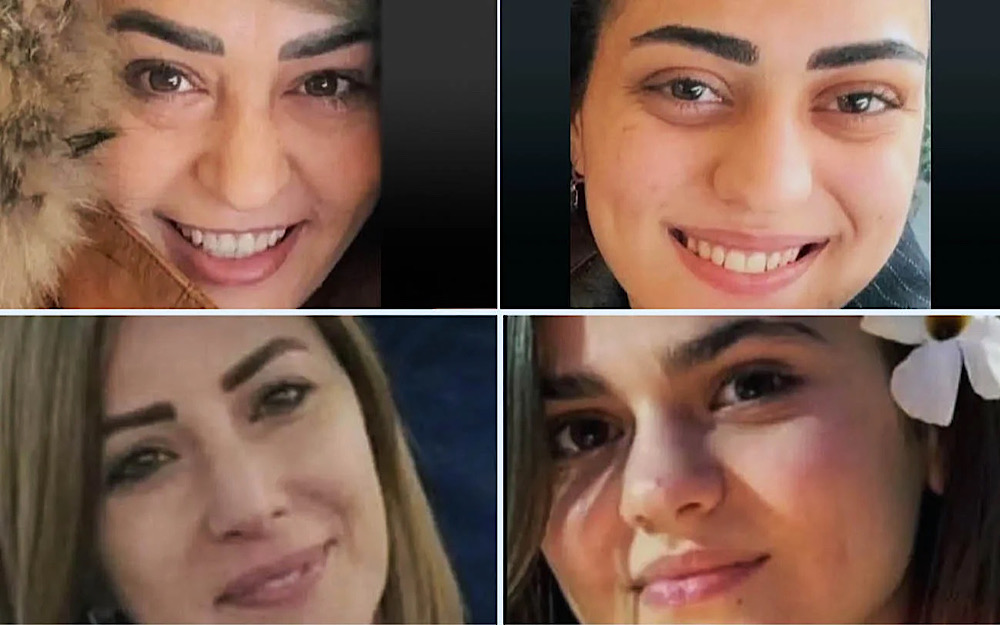Manar Khatib, Ukrainians and the collateral victims of Israel’s war on Iran
Four Palestinian women from a family in Tamra are among the people killed by Iranian rockets, members of an extended family engaged in dialogue. Israel’s Arab towns and villages are most exposed because they lack bunkers and safe rooms. Italian Friends of Neve Shalom Wahat al-Salam are outraged that some in Israel “toasted watching rockets fall on Palestinian neighbours”. A group of Israeli and Iranian intellectuals issued a joint appeal for “peace and diplomacy”.
Jerusalem (AsiaNews) – The ongoing war between Israel and Iran, triggered by the attacks last Friday (13 June) by the Jewish state, which led to the military response by the Islamic Republic, highlights once again disparities in Israeli society.
This is especially true for Israeli Arab (Palestinian) communities in northern Israel. In fact, four people died in the Arab Israeli town of Tamra while dozens were injured when an Iranian missile landed on a residential area.
Israeli Arab towns are vulnerable because of the lack of air shelters and bunkers, unlike Jerusalem, Tel Aviv, and other Jewish majority locations, which have government-built facilities and are better protected from Iranian reprisals, although here, too, deaths and injuries have been reported.
The four women killed in Tamra, a town located east of Haifa, are Manar Khatib, 45, her two daughters, Shada, 20, and Hala, 13, and a relative, Manar Diab. They were among the first casualties in Israel, victims of Iranian missiles launched overnight on 14 and 15 June.
The three-storey house where they were staying was hit by a rocket and destroyed. The building lacked reinforced rooms nor were any air shelters available nearby. Manar’s husband Raja and their youngest daughter Razan miraculously survived.
Mohammad Diab, a rescue and emergency volunteer, spoke of difficulties in reaching the family due to the intensity of the damage caused by the impact, while neighbours spoke of a “terrifying” explosion.
Among those who paid tribute to their memory were the residents of Neve Shalom Wahat al-Salam, a place that is also an active laboratory of coexistence between Israeli Jews and Arabs, and home to a relative of one of the Tamra victims.
The Italian association Amici di Neve Shalom Wahat al-Salam (Friends of Neve Shalom Wahat al-Salam) sent AsiaNews a note explaining that two of the victims in Tamra were related to “Raida Aiashe Khatib, one of the pioneering residents of the village, an English teacher at the community’s primary school”.
Along with condolences to Raida’s family, the village also expressed “solidarity in the face of the unpleasant and shameful episode of villagers near Tamra who toasted watching rockets fall on their Palestinian neighbours.”
The death toll and injuries also include five Ukrainian nationals, including three children, hit by a missile that fell in Bat Yam in the 14 June attack.
In a statement posted on X, which does not specifically mention Ukrainian nationals, “The Embassy of Ukraine in Israel mourns the consequences of the Iranian attack on Israel”, adding that, “Innocent civilians - especially children - should never be the target of missiles”.
One of the factors that emerged from the tragedy in Tamra is the lack of safe rooms in homes or public bomb shelters, as the town mayor, Musa Abu Rumi, noted speaking to CNN, whereas bunkers or public shelters are present in most Israeli cities where Jews are the majority.
In view of the situation, his municipality decided to open educational facilities for use as shelters for anyone who is worried about sleeping overnight at home.
“The government has never financed the construction of shelters in our town, because they have other priorities,” the mayor lamented. Now, he intends to take advantage of the visits of ministers and high government officials, to highlight the neglect in Tamra and bridge “the gap between Jewish Israelis and Palestinian citizens of Israel”.
Israeli law requires that all homes, residential and industrial structures built since the early 1990s must be equipped with anti-nuclear bomb shelters. These facilities are crucial to protect citizens in the event of alerts and attacks, although in recent days Jerusalem and Tel Aviv have also been hit by Iranian missiles.
Despite the law, many Israeli Palestinian towns in the country’s north “lack public shelters, protected areas, and shelter facilities,” this according to a statement by the Association for Civil Rights in Israel.
The Israel Democracy Institute (IDI), an independent research centre published a report in the wake of the Tamra attack, describing how “Arab communities remain unaddressed” almost two years since the outbreak of war, noting a “significant gaps in protection” between Arab and Jewish communities.
At this increasingly critical and violent moment, multiple voices are calling for peace and dialogue, including Iranians and Israelis who joined an appeal by the United States urging a ceasefire and the diplomatic resolution of disputes.
A statement signed by various intellectuals and activists – including Reza Alijani, historian Touraj Atabaki, Gershon Baskin, nuclear expert Behrooz Bayat, writer Orly Cohen and economist Hadi Zamani – expresses "grave concern for the future".
"Israel and Iran,” reads the statement, “have been engaged in indirect wars for decades; a conflict that endangers the entire region, and in particular the people of these nations."
“Iranians, Israelis and Palestinians deserve to live in safety and dignity. Attacks on civilians should be condemned everywhere. The respective governments of our countries have plunged people into this war that does not represent our interests. The continued bloodshed will not bring security to any of our nations.”
Finally, “both sides and the international community” must take "immediate steps to end the violence. We refuse to accept the inevitability of violent conflict, as the only path forward between our nations, Israel and Iran, in a position as eternal arch-enemies. The endless and senseless wars in this region will not benefit our people, who have the right to live in peace and security.”
13/05/2021 16:52
09/10/2023 17:31
20/08/2018 20:00







.png)










